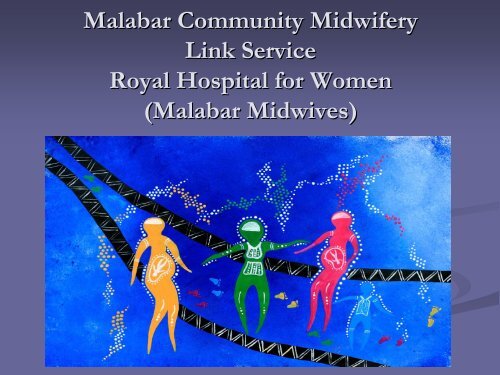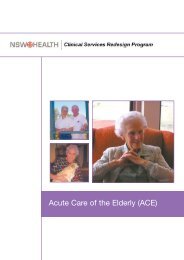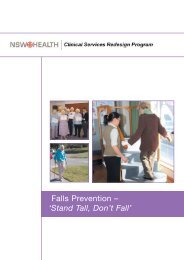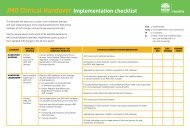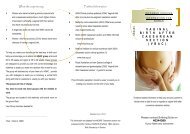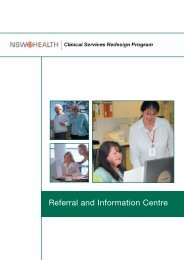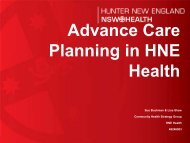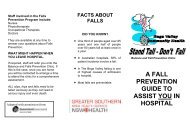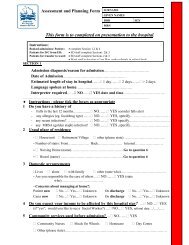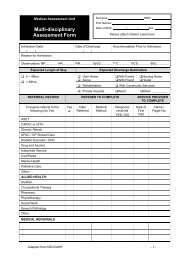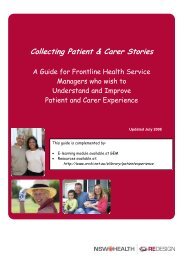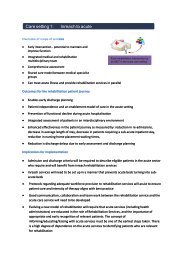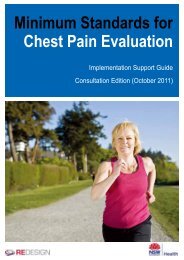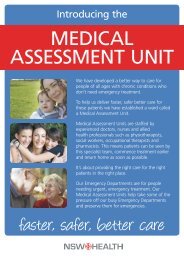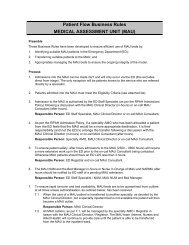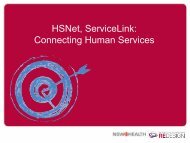Malabar Community Midwifery Link Service - ARCHI
Malabar Community Midwifery Link Service - ARCHI
Malabar Community Midwifery Link Service - ARCHI
Create successful ePaper yourself
Turn your PDF publications into a flip-book with our unique Google optimized e-Paper software.
<strong>Malabar</strong> <strong>Community</strong> <strong>Midwifery</strong><br />
<strong>Link</strong> <strong>Service</strong><br />
Royal Hospital for Women<br />
(<strong>Malabar</strong> Midwives)
Brought to you by:
OUR AIM<br />
• To build upon the success of the existing<br />
Aboriginal Maternal and Infant Health <strong>Service</strong> at<br />
the RHW and provide a culturally appropriate and<br />
accessible service for Aboriginal families.<br />
• To develop strong links with the community.<br />
• To provide a midwifery caseload practice model<br />
where individualised care follows each woman on<br />
her journey through pregnancy, labour, birth and<br />
afterwards.
How we know we are on the right<br />
track….<br />
• Involvement of the local Aboriginal<br />
community in both the development and<br />
implementation of the service<br />
• Our women are coming to see us earlier in the<br />
pregnancy<br />
• Aboriginal women are able to access care with<br />
their own midwife and Aboriginal Health<br />
Worker throughout pregnancy, labour, birth and<br />
after the birth
• Better health for women and babies<br />
• Women and families are involved in health<br />
education activities<br />
• Better child health outcomes for Aboriginal<br />
children 0- 4 years<br />
• Women get to know the Child and Family<br />
Health Nurse during their pregnancy
<strong>Malabar</strong> Midwives<br />
1B Prince Edward St <strong>Malabar</strong><br />
• Six midwives<br />
• Mentored Aboriginal Midwife position<br />
• An Aboriginal Health Worker.<br />
• A Child and Family Health Nurse<br />
• A <strong>Community</strong> Pediatrician<br />
• Aboriginal Administration Assistant<br />
• Strong links and partnerships with:<br />
• Aboriginal Health Workers<br />
• Child and Family Health<br />
• Sydney Children's Hospital<br />
• Women’s s Health and Sexual Health<br />
• <strong>Community</strong> organizations
Type of Care<br />
• Caseload – Continuous care from a midwife the woman<br />
knows<br />
• Choice of birth place, delivery suite or birth centre at<br />
the RHW<br />
• Choice of place for antenatal visits at <strong>Malabar</strong>, RHW,<br />
La Perouse Aboriginal Health Centre, Redfern AMS,<br />
home or a convenient location for the woman<br />
• After the birth care in the home<br />
• Outreach clinic at La Perouse Aboriginal <strong>Community</strong><br />
Health Centre
La Perouse Aboriginal <strong>Community</strong><br />
Health Centre
La Perouse Aboriginal <strong>Community</strong><br />
Health Centre
Aboriginal Health Worker<br />
• Strong cultural and<br />
community link<br />
• Important for the success<br />
Of the service<br />
• Supports women and<br />
families<br />
• Health education<br />
• Guided by what the women want<br />
Bec's quote regarding care from the MCMLS:<br />
It was the best thing you can have for your pregnancy. It's your support unit,<br />
your back up for the hardest and the best thing in your life. I relaxed as soon<br />
as I saw Trudy and Kate.
Health Education Activities<br />
Trudy doing Belly Casts<br />
First Aid/ CPR<br />
Soap & Lotion<br />
Making
Health Body Health Mind Camp
Evaluation<br />
Comprehensive formal evaluation University of<br />
Technology, Sydney measuring the following:<br />
• Maternal and neonatal outcomes determined by<br />
NSW Health funding agreement<br />
• Child and Family Health outcomes<br />
• Clinician experiences<br />
• Women’s experience<br />
• Cost analysis
Outcomes 2007<br />
• 43 women cared for in the first year (30% of total<br />
caseload of the service)<br />
• 71% of Aboriginal women attending the RHW for<br />
birth cared for by <strong>Malabar</strong> <strong>Service</strong><br />
• 65% of women attended for pregnancy care prior to<br />
20 weeks and 10% of women after 20 weeks<br />
• The majority of women had complex health and<br />
psychosocial issues
Outcomes 2007<br />
• Seventy two percent (72%) of the women who were<br />
cared for by the <strong>Malabar</strong> service achieved a normal<br />
vaginal birth. This compares with the latest published<br />
data from the Royal Hospital for Women (MDC 2005)<br />
where fifty three percent (53%) of women had a normal<br />
vaginal birth.<br />
• There were 23 percent (23%) of women who had a<br />
caesarean section – of which six were emergency<br />
caesareans. This is considerably lower than the overall<br />
rate at RHW at present.
Outcomes 2007<br />
• 8 (19%) preterm babies<br />
• Average birth weight 3166gms<br />
• 68% fully breastfeeding on discharge
Some things we are proud of…<br />
• Women are having pap smears for the first time<br />
• Women contacting us much earlier in their<br />
pregnancy<br />
• Women who are wanting contraception after the<br />
birth are asking us for help<br />
• Women are asking us about all aspects of their<br />
health care
Some things the women say….<br />
• We like having our own midwife and not having<br />
to retell the story over and over to strangers<br />
• Someone you know is always there when you<br />
need them and you can call<br />
• When you see the midwife it is relaxed and not<br />
like coming to a hospital
Lessons learned<br />
• <strong>Community</strong> engagement essential<br />
• Be thorough in applications for funding to ensure<br />
that the service keeps going<br />
• Support from the top very important<br />
• Caseload of 30-35/year per midwife due to the<br />
needs of the women to avoid midwife burn out.<br />
• Extending access to non Aboriginal families helps<br />
the service to keep going<br />
• One Aboriginal Health worker is not enough
Future Scope<br />
• Ongoing funding<br />
• Additional staff positions to enhance service:<br />
1 FTE Aboriginal Midwife<br />
1 FTE Aboriginal Health Education Officer with<br />
health promotion as the focus<br />
1 FTE Social worker<br />
1 FTE Mental Health consultant<br />
• <strong>Community</strong> support and acceptance
Winners 2008 NSW<br />
Aboriginal Health Awards<br />
Excellence In Program and <strong>Service</strong> Delivery<br />
Director Generals Award
With thanks to:


